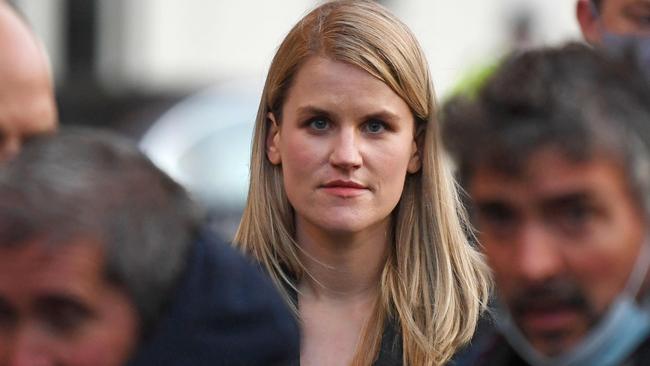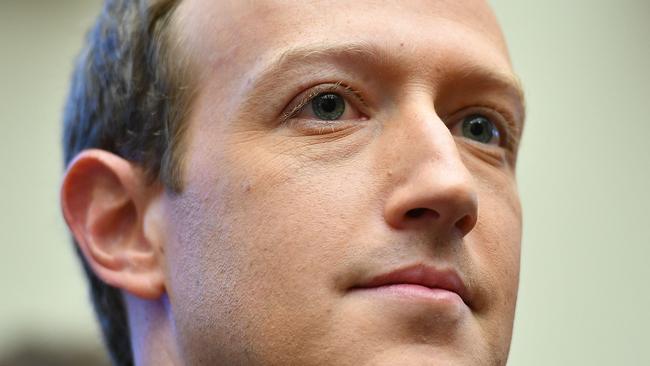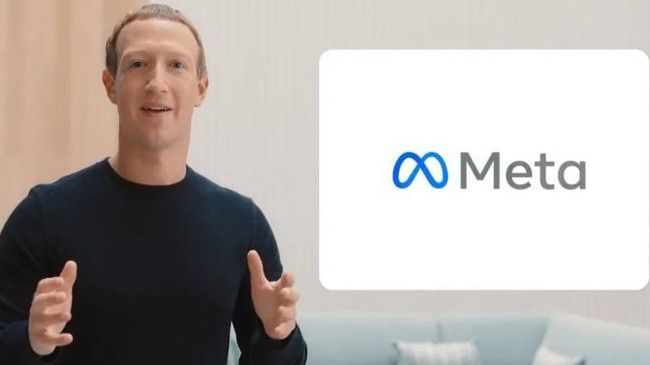Facebook’s rebrand to Meta could be doomed to fail
The social media juggernaut has been hit by scandal after scandal in recent years – and experts say Facebook’s latest move could be doomed to fail.
Social
Don't miss out on the headlines from Social. Followed categories will be added to My News.
Facebook has been plagued by seemingly endless scandals – and experts believe the company’s major rebranding announcement could end up being yet another fail for the social media juggernaut.
On Friday morning, Facebook announced at its annual Connect conference that it would be changing its company name to Meta.
The name comes from the Greek word for “beyond”, and reflects Facebook’s transition away from being a social media platform only, and towards its major focus on developing the metaverse.
“Right now, our brand is so tightly linked to one product that it can’t possibly represent everything that we’re doing today, let alone in the future,” CEO Mark Zuckerberg said.
“Over time, I hope that we are seen as a metaverse company, and I want to anchor our work and identity on what we’re building toward.”
But while the company aggressively touted the new name as an exciting sign of things to come, many insiders believe it won’t be enough to distance Facebook from the serious crises it has faced over the years.
Facebook’s scandals
The announcement comes just weeks after whistleblower and former staff member Frances Haugen leaked the so-called “Facebook Papers” to the media and the Securities and Exchange Commission, and testified before Congress, claiming Facebook put profits over people’s safety.

In February this year, Facebook’s bombshell decision to temporarily ban Australian news from the platform sent shockwaves across the world, and sparked a massive boycott push.
In 2019, NBC News obtained and released thousands of pages of leaked internal documents which revealed Facebook’s plan to grow ever-powerful, including an alleged strategy of using users’ data as a bargaining tool to wield against rivals and help out allies.
In 2018, it was rocked by the Cambridge Analytica scandal, which involved the selling of tens of millions of Facebook users’ personal data to political data firm Cambridge Analytica, without their consent, with the information later used to influence voter behaviour during the 2016 US election (although the breach was not known at the time).
Facebook was ultimately slapped with a $5 billion fine over the fiasco, which was the largest data scandal in its history.
In 2018 it emerged the platform had also been used by anti-Rohingya accounts to incite genocide against the Muslim Rohingya community in Myanmar.
The platform was also accused of spreading mass misinformation in the lead-up to the 2016 US election, and in 2017 it was revealed that hundreds of likely Russian fake Facebook accounts spent around $125,000 on ads during the election campaign.
In 2016 it also landed in hot water after censoring a number of images and videos including a famous Vietnam War picture and clips of the Dakota Access Pipeline protests, and in 2014, Facebook faced yet another major backlash after it was revealed it had secretly carried out psychological tests on almost 700,000 unwitting users back in 2012.

‘Big risk’
Australian public relations expert Nicole Reaney told news.com.au there was a “logical PR spin” to the announcement, given the brand’s expansion and future technological plans.
But she said a corporate rebrand wasn’t enough to counteract Facebook’s recent scandals, although it could help in the longer term.
“A rebrand is a valuable PR tactic to establish a clean slate and redefine a brand,” Ms Reaney said.
“However, with the app continuing its name, there will forever be ties to the backlash the company has experienced.
“The intent will be to also disassociate from the search history tied … to Facebook. Given the gravity of recent events, it’s a worthwhile strategy for the approach as it embarks on winning investors, employees and its global community.”
Meanwhile, brand transformation expert Anaezi Modu told Wired Facebook’s move wouldn’t fix the damage done to its reputation over so many years.
“Unless Facebook has serious plans to address at least some of its many issues, just changing a name is pointless,” she told the publication.
“In fact, it can worsen matters.”

It was a sentiment echoed by fellow branding guru Anne Olderog, who told Business Insider people “can definitely see through things like that at this stage”.
“We’ve already seen this since the day of the cigarette companies, with Altria and company rebranding themselves trying to get away from toxicity,” she said.
“This is exactly what Facebook is trying to do right now.”
In a Bloomberg opinion piece, writers Parmy Olson and Ben Schott argued that companies only “do this as a last resort”, while Manfredi Ricca, global chief strategy officer for consultancy Interbrand, told the Washington Post that for Facebook, “the big risk is nothing really changes” after the name change.
Rebranding fails
Of course, Facebook is not the first household name to embark on a major rebrand – but history shows just how risky the move can be.
In 2001, British Petroleum became Beyond Petroleum in a bid to downplay its fossil fuel interests.
But it failed to bulk up its renewable energy efforts, or adequately publicise environmentally friendly practices – before its reputation was left in tatters after the 2010 Deepwater Horizon oil spill, which is one of the world environmental disasters in US history.
Another famous rebranding mistake was Tropicana orange juice in the US. In 2009, the company completely overhauled its iconic packaging – but didn’t plan on consumers failing to recognise the new-look cartons.
As a result, sales plummeted by 20 per cent, and the company hastily reverted back to the original design.
And private security company Blackwater rebranded first as Xe Services, then Academi Training Centre Inc, after a 2007 incident in Iraq left 14 civilians dead – but its inability to fix the reputational damage also doomed the rebrand, and the company closed in 2014.
But perhaps the most notorious example is the 2003 rebrand of the Philip Morris cigarette company to Altria, which completely failed to safeguard the firm’s other brands, such as Kraft Foods and Miller Brewing, from the harm caused by the tobacco industry.
Manfredi Ricca and fellow branding guru Allen Adamson both told the Washington Post the Philip Morris example, which well and truly “backfired” for the business, represented the “worst-case scenario” for Facebook.
“Facebook’s rebrand to Meta could have similar consequences, if the company’s potentially damaged reputation from the whistleblower’s disclosures endure,” reporter Jacob Bogage wrote, while Mr Adamson said: “Right now, Facebook is going through a Philip Morris moment.”
Originally published as Facebook’s rebrand to Meta could be doomed to fail





